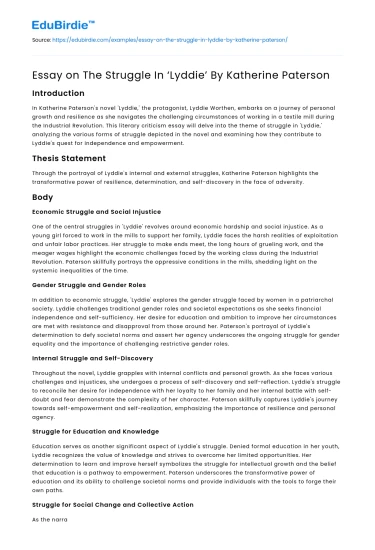Introduction
In Katherine Paterson's novel 'Lyddie,' the protagonist, Lyddie Worthen, embarks on a journey of personal growth and resilience as she navigates the challenging circumstances of working in a textile mill during the Industrial Revolution. This literary criticism essay will delve into the theme of struggle in 'Lyddie,' analyzing the various forms of struggle depicted in the novel and examining how they contribute to Lyddie's quest for independence and empowerment.
Thesis Statement
Through the portrayal of Lyddie's internal and external struggles, Katherine Paterson highlights the transformative power of resilience, determination, and self-discovery in the face of adversity.
Save your time!
We can take care of your essay
- Proper editing and formatting
- Free revision, title page, and bibliography
- Flexible prices and money-back guarantee
Body
Economic Struggle and Social Injustice
One of the central struggles in 'Lyddie' revolves around economic hardship and social injustice. As a young girl forced to work in the mills to support her family, Lyddie faces the harsh realities of exploitation and unfair labor practices. Her struggle to make ends meet, the long hours of grueling work, and the meager wages highlight the economic challenges faced by the working class during the Industrial Revolution. Paterson skillfully portrays the oppressive conditions in the mills, shedding light on the systemic inequalities of the time.
Gender Struggle and Gender Roles
In addition to economic struggle, 'Lyddie' explores the gender struggle faced by women in a patriarchal society. Lyddie challenges traditional gender roles and societal expectations as she seeks financial independence and self-sufficiency. Her desire for education and ambition to improve her circumstances are met with resistance and disapproval from those around her. Paterson's portrayal of Lyddie's determination to defy societal norms and assert her agency underscores the ongoing struggle for gender equality and the importance of challenging restrictive gender roles.
Internal Struggle and Self-Discovery
Throughout the novel, Lyddie grapples with internal conflicts and personal growth. As she faces various challenges and injustices, she undergoes a process of self-discovery and self-reflection. Lyddie's struggle to reconcile her desire for independence with her loyalty to her family and her internal battle with self-doubt and fear demonstrate the complexity of her character. Paterson skillfully captures Lyddie's journey towards self-empowerment and self-realization, emphasizing the importance of resilience and personal agency.
Struggle for Education and Knowledge
Education serves as another significant aspect of Lyddie's struggle. Denied formal education in her youth, Lyddie recognizes the value of knowledge and strives to overcome her limited opportunities. Her determination to learn and improve herself symbolizes the struggle for intellectual growth and the belief that education is a pathway to empowerment. Paterson underscores the transformative power of education and its ability to challenge societal norms and provide individuals with the tools to forge their own paths.
Struggle for Social Change and Collective Action
As the narrative unfolds, 'Lyddie' explores the theme of collective struggle and the power of unity. Lyddie becomes involved in the workers' movement to improve labor conditions and wages. Through collective action and solidarity, the characters in the novel demonstrate the potential for social change and the importance of standing together against injustice. Paterson highlights the significance of communal struggle and the belief that united efforts can bring about transformative outcomes.
Conclusion
In 'Lyddie,' Katherine Paterson paints a vivid portrait of struggle in its various forms, illustrating the challenges faced by individuals during the Industrial Revolution. Through Lyddie's journey, Paterson highlights the resilience, determination, and self-discovery necessary to overcome adversity. The novel explores themes of economic struggle, gender roles, internal conflicts, the pursuit of education, and the power of collective action. 'Lyddie' serves as a testament to the indomitable spirit of individuals in the face of societal injustices and emphasizes the enduring quest for independence and empowerment.






 Stuck on your essay?
Stuck on your essay?

